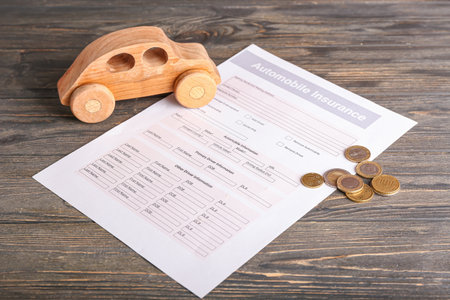Understanding Your Policy Cover
Before you can maximise your payout on a car insurance claim in Britain, it’s essential to thoroughly understand the type of cover you hold. The UK insurance market primarily offers three main types of car insurance: Comprehensive, Third Party, Fire and Theft, and Third Party Only. Each policy type provides different levels of protection, which directly impacts what you can claim for following an incident.
| Policy Type | What It Typically Covers |
|---|---|
| Comprehensive | This is the most extensive cover available, protecting you against damage to your own vehicle (regardless of fault), theft, fire, vandalism, and third-party liabilities. Additional extras such as courtesy cars and legal expenses may also be included. |
| Third Party, Fire and Theft | Covers liability for injury or damage to other people or their property, plus protection if your car is stolen or damaged by fire. It does not pay out for damage to your own vehicle in an accident where you are at fault. |
| Third Party Only | The minimum legal requirement in the UK. It covers only your liability for injury or damage to others; it does not provide any cover for your own vehicle under any circumstances. |
Knowing exactly what your policy includes is crucial at claim time. Insurers will only compensate according to the terms outlined in your policy document. Always review your schedule and wording documents regularly so you’re aware of your entitlements and any optional add-ons that may enhance your payout potential should you need to make a claim.
Gathering Essential Documentation and Evidence
One of the most crucial steps in maximising your payout on a car insurance claim in Britain is to act swiftly in gathering all necessary documentation and evidence following an incident. British insurers place great emphasis on clear, timely, and credible information when assessing claims. Immediately after an accident or any insurable event, you should collect as much evidence as possible to support your case. This not only speeds up the claims process but also helps prevent disputes over liability or damages.
What to Collect After an Incident
The table below outlines the key documents and evidence you should obtain:
| Evidence/Document | Description | Why It’s Important |
|---|---|---|
| Dashcam Footage | Video from your dashcam covering the incident | Provides impartial proof of events and can clarify fault |
| Photographs | Pics of vehicle damage, road layout, weather, and surroundings | Helps document the extent of damage and accident scene context |
| Third-Party Details | Name, address, phone number, insurer, and registration number of other parties involved | Essential for claims involving multiple vehicles or individuals |
| Witness Statements | Contact details and written accounts from people who saw the incident | Can corroborate your version of events if there’s a dispute |
| Police Reference Number (if applicable) | The official report number from police if they attended the scene | Adds credibility to your claim, especially for serious incidents |
| Repair Estimates/Invoices | Quotes or receipts from garages for repair work needed or completed | Supports the value of your claim and ensures fair reimbursement |
Best Practices for Gathering Evidence in the UK Context
- Act Quickly: The sooner you collect information, the more accurate and credible it will be.
- Stay Safe: Only gather evidence if it’s safe to do so; move to a safe location if needed.
- Avoid Admitting Liability: When speaking to other parties at the scene, stick to facts without admitting fault – let insurers decide based on evidence.
- Follow Legal Requirements: In Britain, you must exchange details with other involved drivers and report certain incidents to the police within 24 hours if there are injuries or major road blockages.
- Back Up Digital Evidence: Save photos and footage in multiple locations (phone, cloud storage) in case devices are damaged or lost.
Your Next Steps Matter!
The strength of your documentation can make a significant difference in how smoothly and successfully your car insurance claim progresses. By methodically collecting this evidence immediately after an incident, you put yourself in the best position to receive a fair payout from your insurer.
![]()
3. Notifying Your Insurer Correctly
Promptly notifying your insurer is crucial to maximising your payout on a car insurance claim in Britain. Insurers often have strict timelines for reporting incidents, and failing to adhere can put your claim at risk or reduce the amount you receive. Here’s a clear, step-by-step guide to ensure you report the incident correctly:
Step-by-Step Guide to Reporting an Incident
Step 1: Contact Your Insurer Immediately
Call your insurer as soon as possible after the incident—ideally within 24 hours. Most UK insurers have a 24/7 helpline for claims. Delays in reporting can be viewed unfavourably and may impact your settlement.
Step 2: Gather Essential Information
Have the following details ready when contacting your insurer:
| Information Needed | Details to Provide |
|---|---|
| Date & Time of Incident | The exact date and time when the accident occurred. |
| Location | A precise location—road names, landmarks, or postcodes if possible. |
| Description of Incident | A clear account of what happened, including weather and road conditions. |
| Other Parties Involved | Names, addresses, phone numbers, and insurance details of other drivers. |
| Witness Details | Name and contact details of any witnesses present. |
| Police Reference Number | If police attended, provide the reference number they gave you. |
| Photos/Evidence | Any photos of damage, the scene, and relevant documents (if available). |
Step 3: Provide Honest and Accurate Information
Be truthful and thorough when giving information. Exaggerating or omitting facts can invalidate your claim or result in delays.
Step 4: Request Confirmation
Ask for a claim reference number or written confirmation that your report has been received. This will help track progress and serve as proof of timely notification.
The Importance of Immediate Notification
Contacting your insurer straightaway demonstrates good faith and compliance with policy terms. It also ensures evidence is fresh, supporting a stronger case for maximum payout. Even if you’re unsure whether you want to claim, it’s wise to notify your insurer just in case issues arise later on.
4. Accurately Valuing Your Loss
One of the most crucial steps in maximising your car insurance claim payout in Britain is ensuring that you accurately determine the value of your vehicle at the time of loss. Insurers often base their settlement offers on the market value of your car, which is essentially what a similar vehicle would fetch in the open market immediately before the incident. Being proactive and conducting your own research can help you counter low initial offers and ensure you receive a fair amount.
Tips for Researching Market Value
- Use Trusted UK Valuation Tools: Resources such as Parkers, Auto Trader, and Glass’s Guide are widely recognised by both motorists and insurers across the UK for providing realistic valuations based on make, model, age, mileage, and condition.
- Compare Like-for-Like Vehicles: When gathering evidence, ensure you only compare your car with vehicles of the same year, specification, and mileage bracket. Extras like sat-navs or upgraded interiors can add to your car’s value.
- Document Your Findings: Save screenshots or printouts from valuation tools and classified adverts showing comparable vehicles for sale in your region.
How Market Value Affects Your Payout
The insurer will usually offer a payout based on their own assessment of your vehicle’s market value. If you can provide solid evidence from reputable sources that supports a higher valuation, you’re in a much stronger position to negotiate.
Popular UK Vehicle Valuation Tools
| Valuation Tool | Description | Website |
|---|---|---|
| Parkers | A trusted guide with up-to-date prices for used cars in the UK. | parkers.co.uk |
| Auto Trader | UK’s largest digital automotive marketplace; provides real-time pricing data for similar vehicles currently for sale. | autotrader.co.uk |
| Glasss Guide | The industry standard for trade-in and retail values used by many insurers themselves. | glass.co.uk |
Pro Tip:
If your car had any recent upgrades or was exceptionally well-maintained, keep receipts and service records handy. These details can sometimes justify a higher payout if properly presented during your claim negotiation. By arming yourself with robust evidence and understanding how market value is determined in Britain, you stand a much better chance of securing the maximum possible payout from your insurer.
5. Negotiating with Your Insurance Provider
After receiving your insurer’s initial settlement offer, it’s essential to approach negotiations confidently and methodically. UK insurance providers often start with conservative offers, expecting policyholders to negotiate. Here’s how you can challenge an initial offer, present supporting evidence effectively, and understand your rights if you wish to appeal their decision.
Best Practices for Challenging Initial Offers
- Review the Offer Thoroughly: Compare the amount offered with your own valuation and any independent assessments you’ve obtained.
- Respond in Writing: Communicate via email or letter so there’s a clear record of your correspondence and arguments.
- Stay Professional: Maintain a polite, firm tone throughout discussions. Avoid emotional language or threats, which can undermine your case.
Providing Supporting Evidence
The more robust your documentation, the stronger your negotiation position. Use the following types of evidence to back up your claim:
| Type of Evidence | Description | Relevance to Claim |
|---|---|---|
| Repair Estimates | Independent garage quotes or specialist assessments | Validates cost of repairs exceeding insurer’s estimate |
| Vehicle Valuation Reports | Parker’s Guide, Auto Trader, or Glass’s Guide valuations | Supports higher market value for total loss claims |
| Receipts & Invoices | Proof of recent upgrades or maintenance work | Adds value to the final settlement figure |
Your Rights of Appeal within UK Claims Processes
- If you believe your insurer’s decision is unfair, you have the right to escalate the matter.
Appeal Steps:
- Submit a formal complaint directly to your insurer’s complaints department.
- If unresolved after eight weeks, escalate to the Financial Ombudsman Service. This independent body reviews disputes impartially and can overturn insurer decisions in your favour.
Key Tip:
Keep meticulous records at every stage—emails, phone calls (note date, time, and contact person), and all supporting documents. This will strengthen your position during negotiations and appeals within Britain’s regulated claims framework.
6. Avoiding Common Pitfalls
When making a car insurance claim in Britain, it’s surprisingly easy to fall into traps that could reduce your payout or even void your claim entirely. Understanding and avoiding these common mistakes is crucial to ensuring you get the compensation you deserve.
Frequent Mistakes Claimants Make
| Mistake | Why It’s a Problem | How to Avoid |
|---|---|---|
| Admitting Liability Too Soon | If you admit fault at the scene or in initial conversations, insurers may use this against you, affecting your settlement. | Stick to the facts when speaking with other parties or insurers. Let the insurer determine liability based on evidence. |
| Missing Claim Deadlines | Most UK insurers have strict timeframes for reporting accidents and submitting claims. Missing these can invalidate your claim. | Notify your insurer as soon as possible—ideally within 24 hours. Check your policy for specific deadlines. |
| Failing to Gather Sufficient Evidence | Lack of photos, witness statements, or police reports can weaken your case and reduce your payout. | Take clear photos, collect witness details, and obtain a police reference number if necessary. |
| Underestimating Repair Costs | If you accept the insurer’s first offer without checking quotes, you might not cover all repair expenses. | Get multiple repair quotes from reputable garages before accepting any offer. |
Tips for Sidestepping These Pitfalls
- Stay Calm and Composed: After an accident, keep communication factual and avoid discussing blame at the scene.
- Be Organised: Keep all correspondence and documentation related to your claim in one place for easy access.
- Read Your Policy Carefully: Familiarise yourself with your policy’s terms and conditions so you don’t overlook key requirements.
The Bottom Line
Avoiding these common pitfalls can make a significant difference to your insurance payout. By remaining vigilant, staying organised, and communicating clearly with all parties involved, you’ll put yourself in the best position to maximise your car insurance claim in Britain.


